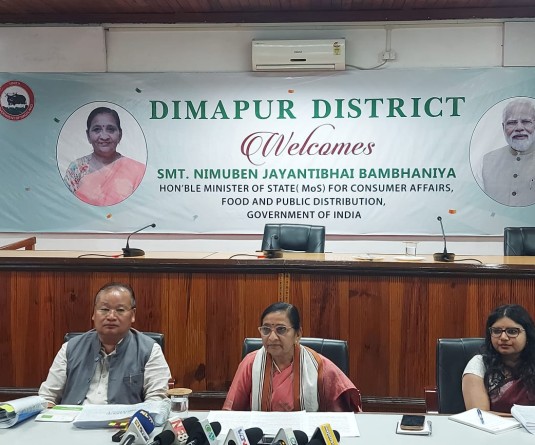
Kohima, November 5 (MExN): The Naga People’s Front (NPF) highlighted to the 16th Finance Commission that focused investment, particularly in surface road transport and infrastructure development, would result in Nagaland achieving significant progress and uplift the living standards of its people.
The prioritisation of road connectivity and funding for infrastructure projects and essential public facilities formed the core of the party’s memorandum submitted to the visiting four-member Finance Commission, headed by Chairman Dr. Arvind Panagariya, during its visit to Nagaland.
Welcoming the Commission, the NPF also pointed out that Nagaland is the second oldest state in the North East Region after Assam, yet it still lags behind in terms of development.
To catch up with the rest of the states in India, the NPF underscored the urgent need for a sufficient allocation of funds for Nagaland in the upcoming five-year financial cycle. It listed several areas of concern that need top priority to foster sustainable development and improve the quality of life.
These concerns included challenges related to road connectivity, which the NPF maintained are hampering economic growth and access to essential services.
Accordingly, the party urged the Commission to allocate adequate funds to ensure the construction of new roads and the upgrading of existing roads, including bridges. Many villages, particularly in rural areas, are yet to be connected with all-weather roads due to a paucity of funds, even after 60 years of statehood, it highlighted.
“Improved road connectivity will facilitate trade, enhance mobility, and promote overall economic development in the region,” the memorandum added.
Meanwhile, the NPF also called for infrastructure development in the form of government office buildings, utility buildings, and staff quarters, which it termed the “backbone of sustainable development for citizens.”
Investing in infrastructure development will not only create jobs but also improve access to markets, education, and healthcare services, thereby contributing to the overall well-being of citizens, it added.
The NPF also maintained that most government buildings and dwellings in the State Capital, District Headquarters, and Sub-Divisional Headquarters—constructed in the early 1960s and 1970s—are now in a dilapidated condition.
Hence, the NPF urged the Commission to prioritise funding for infrastructure projects and essential public facilities.
Meanwhile, noting that agriculture remains the primary livelihood for a significant portion of the population, the party sought funding to enhance agricultural productivity through modern techniques, irrigation facilities, and support for allied sectors such as livestock, fisheries, and agro-processing.
The NPF also stated that quality education is vital for the empowerment of the youth and appealed to the Commission for investments in primary, higher, and technical education to build a skilled workforce capable of contributing to the state’s development.
The party further called for greater focus on building sports infrastructure for the youth of Nagaland.
The NPF also noted that access to a reliable power supply is essential for economic growth and improving the quality of life, urging funding for projects aimed at expanding and modernising the power infrastructure.
On the health sector, it sought support for healthcare facilities, improving access to medical services, and investing in public health initiatives to ensure the well-being of citizens.
“We believe that with focused investment in these areas, particularly in surface road transport and infrastructure development,” the memorandum concluded, signed by NPF President Apong Pongener and MLA & Secretary General Achumbemo Kikon.





